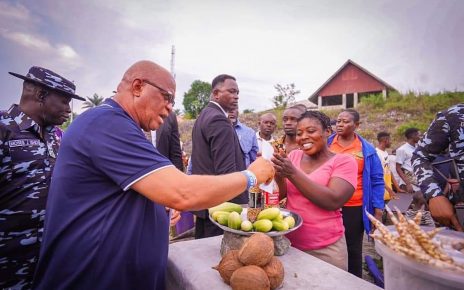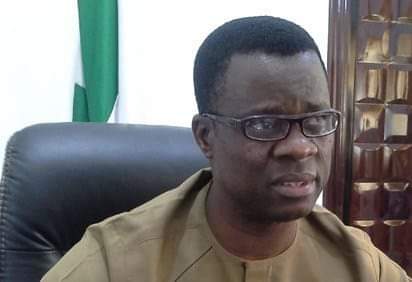By Ukpong Ukpong
Governor Umo Bassey Eno of Akwa Ibom State is asking for community land from chairmen of local government areas. According to news, this request was part of his remarks during a Thanksgiving service for his election victory held at The Apostolic Church, Ikot Ekpene Udo, his hometown, on Sunday July 9, 2023.
If council chairmen accept the request and make available at least 100 hectares of land each, the governor would have a whopping 3100 hectares of land across the state, approximately 31 square kilometers equivalent of two to three sizeable villages put together. Why does the governor ask for communal land? What are his plans?
Obviously, a straight answer would be that the governor wishes to fulfill his election pledge of repositioning agriculture as a driver of our economy, but to those whom this answer may not suffice since previous governors had embarked on agricultural projects without necessarily seeking such large expanse of land, there is need to explain development from Umo Eno’s perspective. The ARISE Agenda holds the key. In it, the governor has outlined smart ways to tackle challenges facing our State by exploiting resources readily available in order to save time and cost.
One of those assets is Land. We understand that land is a scarce commodity in the State with each plot going at a premium and competition for land use is quite intense. Owning a landed property may seem a great investment, yet as valuable as land is perceived to be, it is useless as long as it lies fallow. The reason why land is scarce in Uyo metropolis and some towns where there are economic activities while rural communities around them although endowed with vast fertile land still suffer in poverty.
It is a fact that economic activity adds value to land as such in order to eradicate poverty from rural communities, residents should attract development to themselves as a group. They should stop thinking as individuals and pool resources to create wealth. For instance, if communities would create cooperative farms where they plant cassava in commercial scale, they could take advantage of the supply-demand gap for high-quality cassava flour, which stands at about 485,000 metric tonnes (MT) per annum or that of cassava starch which is about 290,000MT, and improved their livelihood.
According to PwC Nigeria, the country would need about 1.2 million hectares of land planted to meet its annual demand of 28.3 million metric tonnes of fresh cassava root for by-products and derivatives. So, as a serial entrepreneur, the governor is thinking “what’s the point of hoarding land when we can use it to create wealth for the people?” Besides producing food crops, we can revive large scale production of cash crops such as oil palm, coconut, cocoa, rubber and others which can create job opportunities for our people, we can process these produce for export and earn foreign exchange.
Current national exigencies favour prudent resource management thus a smart state administrator should spur indigenous innovations to promote productive economic activities that brings about progress. In our case, agriculture has all the potentials hence the plan to reposition and make it the mainstay of our economy. Through establishment of farm settlement schemes, value chain development, technical and financial support this sector will emerge the conveyor of industrialization. The governor can’t be more correct – our land holds our wealth.
While researching on best ways to utilize community land for poverty eradication and wealth creation, this writer came across the amazing success story of Eriwe fish farming village in Ijebu-ode, Ogun State. Eriwe is a model community based cooperative endeavour started over two decades ago. Today, it has over 3,000 fish ponds scattered over an estimated 156 hectares of land area, employing more than 500 villagers directly as diggers, farm hands, security personnel and fish sellers. It serves as a training center for educational institutions, a major source of protein for the Southwest and Southeast regions with an average fish production turnover of about 2,500 metric tonnes with income generation of about N2 billion annually. This is the biggest fish farming estate in Africa. There are similar success stories across the Southwest and entire North, which we can emulate.
An expert on the environmental management from the Department of Urban and Regional Planning – University of Uyo, Mr. Usen Umoren, supports large-scale farming. Pointing to the relatively small landmass and speed at which the State is growing, he advised that there is urgent need to provide food, employment and other basic amenities to maintain peace. According to him, with well thought out policies aimed to utilize our limited landmass and rich fresh water bodies, we can make a difference. He described the governor’s appeal for land as a bold step towards achieving sustainable development goals.
Currently, Akwa Ibom people continue to struggle with exorbitant cost of food since they are majorly imported from neighbouring states and coastal African countries despite huge funds invested yearly to ramp up our local production. Locales are now producing vegetables like tomatoes, okra, assorted pepper, cucumber, onions and others, but staples like yam, potatoes, garri, rice, beans are imported with growing difficulty due to insecurity in the North and piracy along our coastal waters.
Many might see these challenges as existential threats to our food security when actually they are opportunities for farmers and entrepreneurs to grow more. Good enough, this administration prioritize on agriculture, as a result there are so many business opportunities for everyone. It therefore behooves on various levels of leadership in rural communities and the local government areas to embrace this new policy drive.
Without mincing words, any failure to take advantage of this opportunity would be counterproductive as the governor has warned that he “will not struggle to help the people of [any] community. If we come to your local Government, Village or Community for development, you should receive and encourage us. We are prepared to develop the rural areas. We are prepared to work but let it be that when we come, we don’t meet resistance in any form.”
Yet still, government should painstakingly explain the policy direction to communities through their representatives so as to build a concensus. We are in a democracy therefore it is not enough to declare a policy and expect everyone to fall in line. There should be room for dialogue because no matter how good an idea seems people must be able to understand it and appreciate its benefits before accepting it.
Secondly, there is need for transparency and timely utilization of land acquired. Land is a patrimonial estate in our society hence to part with it one must follow clear and unambiguous procedure. In the past, communities gave land to government but grew to regret the decision because such landed property were left redundant and later sold to government officials. Also, accountability at every step of implementation would encourage participation. Methinks State government should enter into a business partnership with communities and local government areas so that in addition to contributing their land as equity, they should be part of the project management committee and could gradually take control of these projects over a stipulated period of time while paying revenues and taxes to the State. This will eliminate suspicion and engender trust.
Farm settlement schemes will resolve the challenge of land fragmentation. This is a commendable policy bearing in mind that great economies today started with such bold policies decades ago. Today, United States, China, Russia, Isreal, Brazil and others are able to feed themselves, produce agroallied raw materials for their industries and earn foreign exchange from large-scale farming. Here, Govenor Umo Eno pledges to replicate the success stories.
His words, “I am appealing again to all Local Government Chairmen, please give us land not less than one hundred hectares. Send us the land plans through the Secretary to the State Government and see if we will not come there and develop it for the benefit of the people of that local Government”. If we trusted him enough to vote him to power, then we must trust his capacity to take calculated risks with our land.
Ukpong Ukpong, writes from Akai-Ubium. 08157882300, [email protected]





